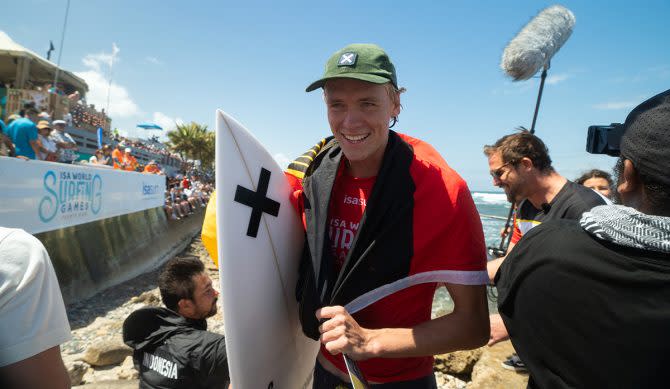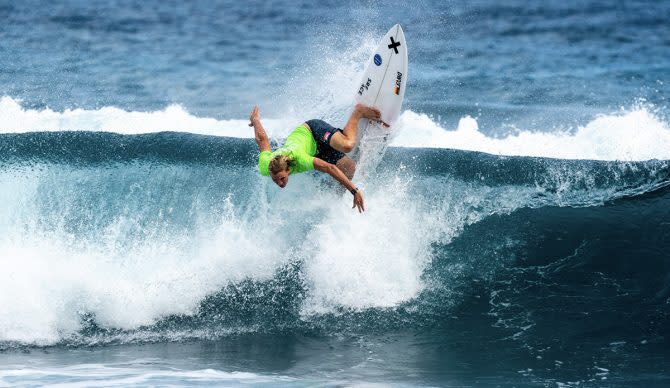Why German Olympic Surfer Tim Elter Could Surprise People at Teahupo’o
- Oops!Something went wrong.Please try again later.
“Introducing the surfer in red, representing Germany, Tim Elter!” You’ll hear something along those lines blaring through the speakers when the Olympic surfing competition runs in Tahiti this July. And you may be wondering…who is Tim Elter?
I have to admit. I, too, was unfamiliar with the 20-year-old, toe-headed German surfer. After all, he wasn’t even supposed to compete in the Olympic qualifier until an injury to one of his teammates opened up a spot. But when he started mowing down Championship Tour surfers at the ISA World Surfing Games a few months back on his way to Olympic qualification, he caught my attention.
A quick scroll through his Instagram proves that he’s no scrub when it comes to barrel riding. Born and raised among the powerful reef breaks of Fuerteventura in the Canary Islands, he clearly learned a thing or two about hunting tubes. And when I got a chance to chat with him on a video call, his composure and intelligence impressed me just as much as his surfing.
When did you realize you wanted to surf in the Olympics?
As soon as (German) Leon Glatzer qualified for 2020. When Leon qualified, I remember I was finishing the school year and watching (the event) between exams. I had goosebumps for a week. Leon is like a big brother to me when we travel. I was like, “Okay, if he can do it, we all can do it.”
So Leon planted the idea in your head, but at what point did you actually believe that it was possible for you to qualify?
Well, I wasn’t on the team. I only got put on the team on December 22, 2023. I was the first alternate for this event. But since I was first alternate, I got taken to the training camp and to the venue where we trained in November. I did great and people were impressed. Then my teammate unfortunately got injured, so it was my turn. At first I was a bit overwhelmed, like “Oh shit, I’m doing my first ISA open for Germany.” But I had the chance to qualify.
The training I had was very specific. I was surrounded a lot by past German Olympians, especially in Judo, a totally different sport. But the mindset and experiences were all similar. Then we went to the venue, surfing just the comp wave in different conditions from knee high, barely surfable, to eight, nine foot and barreling. That gave me a very good connection to Puerto Rico. And the training definitely gave me mental confidence too. It was the first time I went to a competition and my body was in tune with my thoughts, my confidence, my brain, and the venue. I was really well prepared.
In the beginning, I felt like it was already an accomplishment to represent Germany on the world stage. But as soon as I got going, my goal was to be the best German male in this event. Then all of a sudden, I was in main round four and I started thinking, “Okay, I’m getting close, halfway is behind me already in this event.” As soon as I beat Frederico (Morais) in repechage round six, I realized that if I could make that, I could make anything. I felt unstoppable.
What was going through your mind in the moment you qualified?
Relief. Relief was the main feeling because I had suffered the 24 hours before – not just me, we (my team) all did. When you go to bed and you know the following morning that 25 minutes could change your life as an athlete, it’s overwhelming. It’s tough. So when I came out of the water, it was relief and happiness. I felt fulfilled.
Over the next five months, a lot of people both within the surfing world – and outside the surfing world – are going to get to know who you are as an Olympian. What is something that you want people to know?
I have learned to be quite empathetic. I have a lot of empathy. I’d say my willpower is amazing. If I really strive to get something, I will most likely get it if I can control it. I also like to play with words and language. I’m fluent in English, Spanish, German, and almost in French. I have notes of Indonesian and I can understand Brazilian Portuguese. I like to play with language and the meaning. I write little poems and rhymes just to myself. I write feelings down, sometimes to me, sometimes to other people, sometimes just about external things. I also use sarcasm quite a lot. People who don’t know me well get confused by it, but as soon as I spend a bit more time with them, they get it and don’t take me so seriously.

If I’m not mistaken, you’ve never surfed Teahupo’o before. What will your training regimen be like over the next several months?
For now, I’ll have gone to Tahiti twice for two weeks with my teammate Camilla (Kemp) plus the staff and coaches. The first trip was in April. We’re doing a lot of logistics and planning right now. But in between those training camps, we’ll be doing a lot of physical work. I believe my paddle power is pretty good because I have very long arms, but we want to increase it even more as well as working on mind games and confidence. I think I’m pretty solid in that I’ve grown up in heavy waves. I feel confident in them. So I’ll work on the physical aspect and definitely on getting to know the place and getting a rhythm with Tahiti.
When you’re not in Tahiti, are you going to focus your surfing purely on left-hand barrels?
I’ll probably try to make trips to get out of my comfort zone. But I won’t overdo it. I’m a calculated guy when it gets sketchy. But still there’s some things you can’t control so there’s always a chance of getting injured. I’ll probably spend some time in Hossegor where I live now. Whenever I have the chance to get pitted somewhere close, I’ll do it. But that’s what I do anyway. I’m obsessed with (getting tubed).
What surfers do you take inspiration from?
The person who inspires me in terms of charging is Benjamin Sanchis. When it gets sketchy I’m most likely with him getting pitted. Internationally, Nic Von Rupp, not just for the commitment he has and the waves he scores, but also the work he puts into things. He’s very professional. He’s always thinking about business, everything he can to do great. And in terms of competition, Leon Glatzer is a big influence on me, Marlon Lipke as well. They’re the two biggest (Germans) that have made a name and they helped me out.
Let’s talk about your experience in Puerto Rico. How was it surfing against some of the best surfers in the world?
I guess you realize you become part of it. Those guys are on the CT and they’ve come a long way. However, in the end, you have the best surfers of every country. So I’d say by coming to the ISA, you’re part of that group. All these names on paper, they all rip. But it comes down to tactics, because in the end, the best results will go to the best competitor and not the best technical surfer. As a kid when I first came into the QS and I had to surf heats with Joan (Duru) or Tim Bisso – big regional names – and I would get so scared. I’d see it come up and then I’d be so nervous and I wouldn’t surf at all. I’ve worked a lot on that over the last years. I also think it played in my favor that I was an underdog. Some people may have underestimated me.

What did you learn from the World Surfing Games experience?
(I learned how to) be collected, to be calm. When it comes down to those 20, 25 minutes in the water, be calm, be collected, be cold-blooded, and be aware of what you do. And, like always, have the belief that you can fight back. We’re working a lot on accepting things. Okay, the first 10 minutes of the heat didn’t work out. I’m not going to get stuck. I’m trying to change the next 10 minutes. And (I learned) about sportsmanship. It’s just great to see that we all share the same passion. We follow the same dream whether it’s someone from Jamaica, an up-and-coming German grom, or Filipe Toledo. We all have the same goal and we all live the same life.
How would you describe your headspace and emotions heading to the Olympics?
I’d say (I have) a lot of pride for what I’ve achieved, what I’m living, and what will happen. I feel a lot of gratitude for those who have supported me. And in the sportsman mindset, I feel confident. I’m going to keep on training and give it my all in the preparation. I’ll give the max so that when I look back, I don’t regret anything. I think that’s one of the only fears I have been living with over the last few years, that maybe when my career is over, I’ll look back and realize I didn’t do all I could. So I’d rather sacrifice now, (choosing) surfing over other things that may be as important. And then when the career is over, I still have a lot of years to go after what I didn’t do when I was younger.
For more from Tim Elter, check out his YouTube page, here.
The post Why German Olympic Surfer Tim Elter Could Surprise People at Teahupo’o first appeared on The Inertia.

